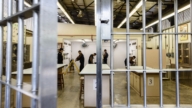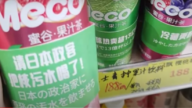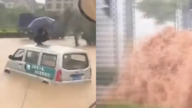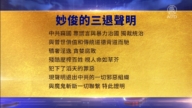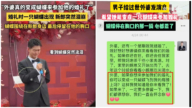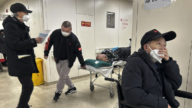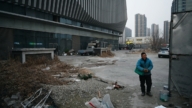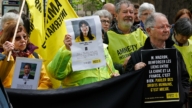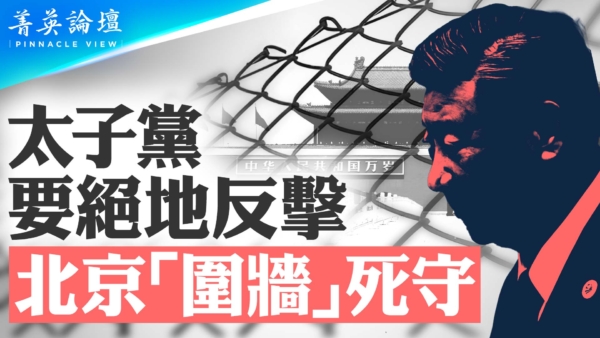【新唐人2015年02月13日訊】在中國大陸,「看病難、看病貴」現象長期持續,已嚴重困擾著老百姓的正常生活,即使有醫療保險,也無濟於事。為甚麼會這樣呢?日前有媒體披露,各種「潛規則」在醫院內部大行其道,採購藥品、器械要收回扣,醫院建樓也要撈一筆,而這些醫療腐敗成本都會轉嫁到老百姓身上。安徽去年已有16家公立醫院院長因涉貪落馬。
《新華網》2月8號報導,安徽省檢察機關反貪部門,去年共立案偵查醫療貪污賄賂案件108件、涉案123人,其中院長16人、副院長6人,個別地市甚至出現絕大部分二甲以上公立醫院都有相關人員被查處的「塌方式」腐敗。
安徽省檢察院反貪局通報稱,去年被查處的醫院院長,包括阜陽市人民醫院原院長高學中、六安市人民醫院原院長朱德昌、蒙城縣中醫院原院長丁懷順等16人,多個縣級醫療「龍頭」單位的主要負責人也被查。
報導指出,涉案醫院的院長主要通過藥品採購、醫療器材採購,以及基建工程等三個環節「以權換錢」。藥品公司為了讓醫院多採購自己的藥品,給予醫院相關負責人及院長回扣,多家院長「欣然笑納」,與藥企或供應商形成高度默契。
上海維權人士杜亞明:「醫生的處方權都拿回扣的,處方越是開的多,醫生的回扣越是多。那麼醫生每天就有意識的往這方面發展,有些根本不需要用這種藥的,他也為了拿回扣,大量的開這種藥。」
在醫療器材採購方面,報導說,一些大型設備價值高昂,企業方和醫院簽訂融資租賃協議,約定利潤分成。而企業在得標後,為了取得高額利潤,還常常行賄醫院主要負責人,讓醫院優先、長期使用其醫用耗材。
杜亞明:「進了醫院,傷風咳嗽、或者你血壓稍微高一點,所有的器械設備都要給你來一次,這樣子你毛病還沒看,你幾千塊的檢查費已經跟進去了,尤其你如果生個癌啊,他會所有的科室,先外科、再是內科,再是心血管科,你每換一個科,他都給你重新再檢查一遍。」
報導透露,院長在醫院基建工程方面的權力更大,「胃口」也更大。他們手中的權力能夠幫助承建商繞開規範的招標程序,承接造價動輒成百上千萬元的醫院基建工程。招標環節成為「走形式」。
旅美中國社會問題研究人士張健:「從它的工程項目開始,它就存在了腐敗,存在了吃、拿、要回扣,以及偷工減料、豆腐渣工程,當然一個醫院建成之後,又會在內部對員工進行苛扣,然後醫生又對病人進行苛扣,變成站著進來,躺著出去,所以病人也會給醫生紅包,這就是一種腐敗滋生的情況。」
中共檢察機關辦案人員稱,院長貪腐,往往意味著這家醫院已經從上到下「爛掉」。據基層醫療機構工作人員反映,院長和主要負責人受賄,醫院其他幹部和醫生也往往受風氣影響,甚至有了「法不責眾」的觀念,慢慢形成了「收回扣」的慣例。
張健:「醫院的高層在選拔和任用各個科室的主任和高層的時候,又有錢權和色情的交易。醫院對於採購部門也同樣存在著藥品方向把握不嚴,拿高額的回扣或者用假藥、劣藥來坑矇拐騙患者。所以整個醫院系統的腐敗是方方面面的,包括現在的醫託都是由醫院來進行控制的。」
據檢察機關的公開資料,16名落馬院長的涉案金額巨大,如六安市人民醫院原院長朱德昌在醫院外科醫技樓、綜合門診樓工程及藥品集中採購過程中,非法收受賄賂279萬元人民幣,阜南縣人民醫院原院長劉學武更是涉嫌受賄上千萬元。但他們的實際受賄金額,可能遠遠高於官方公布的數據。
《中國網》「觀點中國」指出,大部分醫院都設有內部監督機構,但是形同虛設,這與醫院的專業性有關。進甚麼藥品,買甚麼醫療器械,由權威説了算,但很多醫院的院長不僅僅是醫院的行政領導,更是該院的業務骨幹、醫術權威,集權力和技術決定權於一人,監督往往失效。
採訪/朱智善 編輯/陳潔 後製/鍾元
Corrupt Hospital Directors Obtain Bribes From Pharmaceutical Companies
Mainland Chinese have often experienced the difficulties and high costs of medical treatments. Even if they do have medical insurance, the issue still exists and people still pay a high price. The question remains, Why is it so?
Recently, it is reported that various “hidden rules" are prevailing within hospitals, which include claiming back-handers or returns for the procurement of medicines and equipment, as well as the building and construction. However, such corruption costs of the hospital are all passed on to the patients. Just last year, directors of 16 public hospitals in Anhui Province, faced charges of corruption.
“Xinhua" reported on Feb. 8, the Anti-corruption Bureau of Anhui Provincial Procuratorate officially investigated 108 cases related to corruption and bribery within the medical field,which involved 123 people including 16 directors and six deputy directors of hospitals. In some individual cities, the vast majority of First Class Grade II hospitals, were found to have staff investigated on charges of corruption.
Anti-Corruption Bureau of Anhui Provincial Procuratorate, disclosed that 16 hospital directors had been investigated and punished last year, including Gao Xuezhong, former director of the People’s Hospital of Fuyang City, Zhu Dechang, former director of the People’s Hospital of Lu’An City, Ding Huaishun, and the former director of Mengcheng County Hospital. In addition, the heads of “key” medical institutions of a few counties were also caught and investigated.
It is reported that the relevant presidents of the hospital mainly realised “the exchange of money with power” through three key channels including medicine procurement, medical equipment procurement, and the infrastructure projects. In order to sell more medicines to hospitals, the pharmaceutical companies gave back-hander payments to the relevant key persons and the president of the hospital. Many presidents of hospitals “are pleased to accept the back-handers", and formed a highly tacit understanding between themselves and the pharmaceutical companies or suppliers.
Shanghai activist Du Yaming: “When doctors issue prescriptions, they take the corrupt money. More open prescriptions, more back-handers. Then the doctor intentionally issues the prescriptions for such medicines. Some patients may not even need to use such medicines, yet doctors still prescribe them, in the process of accepting paybacks.”
Regarding the medical equipment procurement, it is reported that hospitals signed finance lease agreements for those high-value large scale equipment with the suppliers, and set up profit-sharing agreements. After the suppliers won the bid, in order to obtain high profits, they often bribe the hospital heads so that the hospital prioritises consuming their medical supplies for a long period of time.
Du Yaming: “Once you went to the hospital, colds and coughs or just slightly higher blood pressure, all the appliances and equipment provided by them, was used to examine you. So before you receive the treatment, you have to pay a few thousands RMB for the examination fee. Especially if you suffered with cancer, you would be examined through various channels, first surgery, then internal medicine, cardiology etc. Every time when you change a department, you would be re-checked again."
The reports revealed that a hospital president owns greater power in hospital infrastructure projects, and their “appetite" for paybacks is even greater. The power in their hands helps contractors shunning standard tendering procedures, and winning the infrastructure projects of a hospital which costs hundreds of thousands of yuan. The bidding procedures become “pro forma."
Zhang Jian, a Chinese social problems researcher in America. He said: “A project from its beginning, has the existence of corruption, including meals, taking money, taking kickbacks, as well as jerry and shabby projects. Of course, after the completion of a hospital, the hospital is hard on internal staff, and then require the doctors to be hard on patients which costs the patient a lot of money. So the patients have to give red envelopes to bribe the doctors. This is the corruption situation in our hospitals."
The investigators of the procurator department of the Chinese Communist Party (CCP) said, the corruption of the president of a hospital often means that the hospital has been “rotten" from top to bottom. According to staff at the grassroots of these medical institutions, the presidents and other key people, are also involved in the bribery. This then has a knock on effect to the other staff who have Come to realise, “law does not punish many law breakers", and that slowly a situation forms and becomes routine of “taking kickbacks" in hospital practice.
Zhang Jian: “When the executives of hospitals promote or select the appointment of directors and senior positions of various departments, they use their position of power for exchanging money and sexual trade. The hospitals also have such problems as lax control and management over procurement departments for purchasing medicines, taking substantial kickbacks or using fake or inferior medicines to swindle patients. So the whole hospital system is corruptive in all aspects, and this even includes the current hospital scalpers, who are now controlled by the hospitals."
According to the public information published
by the procurator department,
these 16 presidents of the hospitals in question, are involved
in huge of money.
For example, the former president Zhu Dechang of Lu’An
People’s Hospital, illegally accepted bribes of 2.79 million
yuan when he was in charge of the construction of surgical
medical technology building and
comprehensive outpatient building,
he was also involved in the centralised medicine procurement process. As the former president of Funan County People’s Hospital, Liu Xuewu is suspected of taking bribes of tens of million RMB. But their actual amount of bribes may be far higher than the officially published amounts.
“View China" of “China Network" pointed out that most hospitals set up internal oversight bodies, but they are almost non-existent, which is related to the professional features of a hospital. What sort of specific medicines, and what sort of medical equipment are used, are all determined by the authority of the hospital. However, many presidents of hospitals are not only the head of administrative authority of the hospital, but also the backbone of the hospital business, medical academic authority, who have the administrative power and decision-making power on medical skills. So the internal supervision system often fails.
Interview/Zhu Zhishan Edit/ChenJie Post-Production/ZhongYuan


